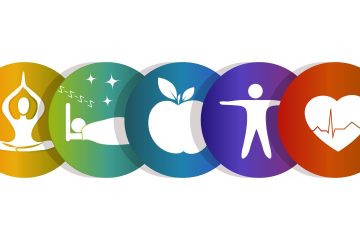Table of Contents
- Exploring the Diverse Landscape of Health Occupations
- Essential Skills and Qualifications for Thriving in Health Careers
- Navigating Career Pathways in the Healthcare Sector
- Emerging Trends Shaping the Future of Health Professions
- Building a Sustainable Career: Tips for Long-Term Success in Health Occupations
- Q&A
- Concluding Remarks
Exploring the Diverse Landscape of Health Occupations
The healthcare sector is incredibly vast, encompassing a multitude of roles that cater to various needs within communities. From direct patient care to behind-the-scenes support, each occupation plays a vital role in maintaining health and well-being. Some of the most recognized professions include:
- Physicians - Diagnose and treat illnesses.
- Nurses – Provide bedside care and support to patients.
- Pharmacists – Dispense medications and offer pharmaceutical advice.
- Therapists – Assist with rehabilitation and recovery.
- Health Administrators – Manage healthcare facilities and resources.
However, the scope of health occupations extends far beyond these traditional roles. There are numerous allied health professionals who contribute significantly to patient care and treatment. Among these are:
| Occupation | Key Responsibilities |
|---|---|
| Radiologic Technologists | Perform imaging procedures for diagnostics. |
| Medical Assistants | Support both clinical and administrative tasks in healthcare settings. |
| Dietitians | Provide nutritional advice for better health outcomes. |
| Occupational Therapists | Help patients improve daily living skills. |
The landscape of health occupations is continually evolving, influenced by advancements in technology, changing regulations, and shifting societal needs. Emerging fields such as telehealth and genetic counseling exemplify this progress, offering innovative solutions for modern healthcare challenges. With a myriad of specialties and career paths available, the opportunities in this field are not only diverse but also dynamic, encouraging lifelong learning and adaptation.


Essential Skills and Qualifications for Thriving in Health Careers
In the ever-evolving field of health careers, possessing the right skill set and qualifications is crucial for success. Professionals in this arena must blend technical competency with interpersonal prowess to provide the best care and support to patients. Among the most essential skills are:
- Communication: The ability to effectively relay information to patients, families, and colleagues is imperative.
- Critical thinking: Health professionals must assess situations quickly and determine the best course of action.
- Empathy: Understanding and relating to patients’ concerns fosters trust and improves outcomes.
- Teamwork: Collaborating with multidisciplinary teams enhances patient care and promotes a culture of support.
Additionally, certain qualifications provide a solid foundation for a rewarding career in healthcare. While specific requirements may vary by role, many positions typically demand:
| Qualification | Description |
|---|---|
| Degree | A relevant degree in areas such as nursing, pharmacy, or public health. |
| Certification | Professional certifications to validate expertise and specialized knowledge. |
| Experience | Hands-on experience through internships, clinical placements, or direct patient care. |
Additionally, continuous professional development is vital to remain competitive in this dynamic landscape. Engaging in workshops, pursuing advanced degrees, and staying informed on the latest healthcare innovations are key strategies for career advancement. Health professionals who actively seek opportunities for growth not only enhance their skill set but also contribute positively to patient care and the healthcare community overall.


Navigating Career Pathways in the Healthcare Sector
The healthcare sector offers a plethora of career opportunities, each with distinct roles and responsibilities. As the industry evolves, professionals can carve unique pathways that align with their interests and strengths. Key areas to explore include:
- Clinical Roles: Positions such as nurses, physicians, and allied health professionals are essential for patient care.
- Administrative Positions: These roles, like healthcare administrators and medical office managers, focus on the operational aspects of healthcare facilities.
- Research and Development: For those inclined towards the scientific side, opportunities in clinical research and pharmaceuticals are vast.
Understanding these pathways allows aspiring healthcare professionals to make informed choices about their education and career trajectories. Many individuals often find themselves drawn to more specialized fields, such as pediatrics, geriatrics, or mental health. Below is a table outlining some common career paths with educational requirements:
| Career Path | Typical Degree Required |
|---|---|
| Registered Nurse (RN) | Bachelor of Science in Nursing (BSN) |
| Medical Billing Specialist | Associate Degree or Certification |
| Physical Therapist | Doctor of Physical Therapy (DPT) |
In navigating these diverse pathways, mentorship and networking can provide invaluable support. Engaging with industry professionals through internships, workshops, and conferences contributes not only to skill enhancement but also to cultivating meaningful connections that can guide one’s career. Embracing continuous learning and remaining adaptable to industry changes is crucial for long-term success in this dynamic field.


Emerging Trends Shaping the Future of Health Professions
The landscape of health professions is transforming rapidly, influenced by technological advancements and societal changes. One major trend is the integration of telemedicine, which allows healthcare providers to reach patients from remote locations. This approach not only enhances accessibility but also supports continuity of care. Patients, especially those in rural areas, benefit significantly from virtual consultations, enabling timely interventions without the need for lengthy travels. The rise of wearables and mobile health applications further complements this trend, providing real-time health monitoring and promoting proactive health management.
Moreover, the emphasis on interdisciplinary collaboration is shaping the way health professionals work together. Healthcare teams now often comprise diverse specialists, including doctors, nurses, pharmacists, and mental health professionals, all collaborating to provide comprehensive patient care. This shift encourages a holistic approach to treatment, addressing not just physical but also mental and emotional well-being. Educational programs are evolving to reflect this change, emphasizing skills such as communication and teamwork alongside traditional medical training.
| Trend | Description |
|---|---|
| Artificial Intelligence | AI is being utilized for predictive analytics, enhancing diagnostic accuracy, and personalizing treatment plans. |
| Patient-Centered Care | Focus on tailoring healthcare services based on individual patient preferences and values. |
| Focus on Mental Health | Increased awareness and integration of mental health services into primary healthcare settings. |


Building a Sustainable Career: Tips for Long-Term Success in Health Occupations
Embarking on a career in health occupations demands not only a passion for helping others but also a strategic approach to ensure longevity and fulfillment in the field. To cultivate a sustainable career, it’s important to embrace a mindset of continual learning and adaptability. The healthcare landscape is ever-evolving, with advancements in technology, treatment protocols, and patient care standards. Consequently, staying current with industry trends through professional development and continuing education opportunities is essential. Consider participating in workshops, attending conferences, or pursuing further certifications that align with your career goals.
Networking plays a crucial role in sustaining a successful career in health occupations. Establishing meaningful connections with colleagues, mentors, and industry leaders can open doors to new opportunities and collaborations. Engaging in professional associations not only enhances your knowledge but also helps you build relationships that can provide support and guidance throughout your career journey. Leverage platforms like LinkedIn to maintain these connections and actively participate in discussions related to your field. Being part of a professional community can inspire growth and ignite passion for your work.
Work-life balance is pivotal in fostering a sustainable career in health occupations. High-pressure environments are common in healthcare, making it essential to prioritize self-care and set boundaries to prevent burnout. Here are some effective strategies to consider:
- Schedule regular breaks to recharge and reflect, ensuring you maintain mental clarity.
- Engage in hobbies outside of work to reduce stress and enhance your well-being.
- Practice mindfulness techniques to remain grounded and focused.
| Strategy | Description |
|---|---|
| Time Management | Use planners or digital tools to organize daily tasks effectively. |
| Physical Activity | Incorporate regular exercise into your routine to boost energy levels. |
| Seek Support | Don’t hesitate to reach out for help from colleagues or mental health professionals. |
Q&A
Q&A: Exploring Health Occupations
Q1: What are health occupations? A1: Health occupations encompass a wide range of professions focused on promoting, maintaining, and restoring health. This includes roles like doctors, nurses, therapists, and technicians. Essentially, anyone involved in delivering health care and services falls into this category.Q2: What qualifications are typically required for health occupations? A2: The qualifications vary significantly depending on the specific occupation. For instance, medical doctors usually require a bachelor’s degree, medical school, and residency training. In contrast, healthcare support roles, like nursing assistants, may require only certification or an associate degree. Always check the specific requirements for each profession to understand the educational pathway fully.
Q3: Are there any emerging trends in health occupations I should know about? A3: Absolutely! One of the standout trends is the increasing demand for telehealth professionals as remote healthcare gains traction. Additionally, roles focusing on mental health care and geriatric services are on the rise, driven by an aging population and shifting societal needs.
Q4: What skills are essential for success in health occupations? A4: Key skills include strong communication, empathy, problem-solving, and attention to detail. Healthcare professionals often deal with sensitive situations, making emotional intelligence and adaptability equally critical. The ability to work in teams is also essential, as healthcare often involves collaboration across various disciplines.
Q5: How can I choose the right health occupation for myself? A5: Start by exploring your interests and strengths. Consider volunteering or shadowing professionals in various fields to gain insight into their daily activities. Additionally, researching different roles and speaking to mentors can provide clarity on what might align with your career aspirations.
Q6: What career growth opportunities exist within health occupations? A6: The healthcare field offers numerous pathways for advancement. Many professionals can move into leadership roles, specialized areas, or academic positions. Continuing education through certifications, workshops, or advanced degrees can open doors to higher salaries and new responsibilities.
Q7: How do health occupations impact the community? A7: Health occupations play a vital role in improving community wellness. Professionals in this field contribute to disease prevention, health education, and immediate care during crises. Their work ensures a healthier populace, which translates to enhanced quality of life and productivity within the community.
Q8: What are some resources for those interested in pursuing a health occupation? A8: There are numerous resources available to aspiring health professionals. Websites like the U.S. Bureau of Labor Statistics provide detailed information on job outlook, salary, and educational requirements. Professional associations often offer networking opportunities, conferences, and additional educational resources that can be invaluable.
Q9: Can health occupations provide a work-life balance? A9: Work-life balance in health occupations varies widely based on the specific role and setting. While some positions may demand long hours, especially in acute care, other roles, like healthcare administration or telehealth, may offer more flexibility. It ultimately depends on personal preferences and career goals.
Q10: What is the future outlook for health occupations? A10: The future of health occupations looks promising, with the industry projected to grow as the population ages and healthcare needs increase. Innovations like artificial intelligence and digital health are also reshaping the landscape, presenting new career opportunities and changing how care is delivered.
This Q&A aims to shed light on the diverse and dynamic world of health occupations, providing essential insights and guidance for those interested in pursuing a career in healthcare.




0 Comments